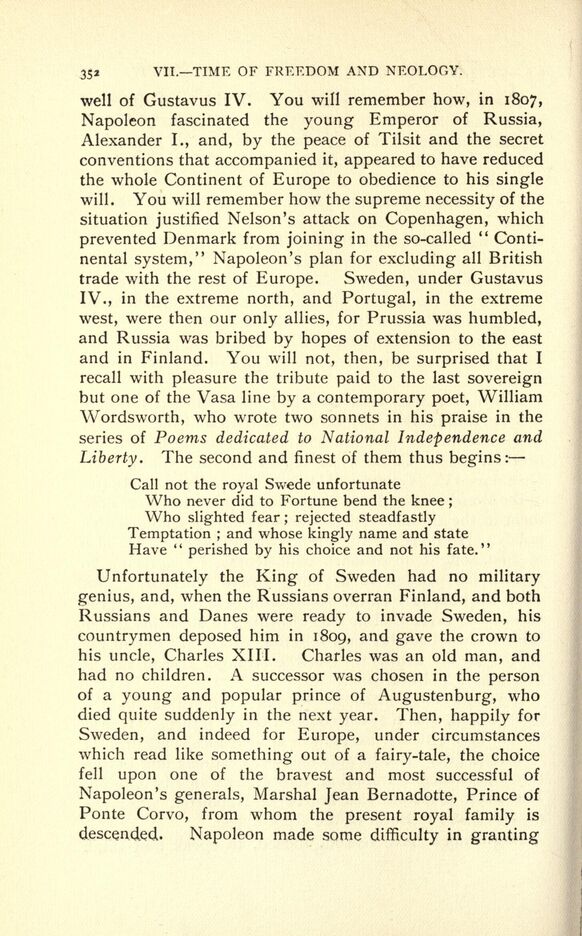
Full resolution (JPEG) - On this page / på denna sida - VII. The Church in the “Time of Freedom” and Period of Neology (1718—1811 A.D.)

<< prev. page << föreg. sida << >> nästa sida >> next page >>
Below is the raw OCR text
from the above scanned image.
Do you see an error? Proofread the page now!
Här nedan syns maskintolkade texten från faksimilbilden ovan.
Ser du något fel? Korrekturläs sidan nu!
This page has never been proofread. / Denna sida har aldrig korrekturlästs.
35* VII. TIME OF FREEDOM AND NEOLOGY.
well of Gustavus IV. You will remember how, in 1807,
Napoleon fascinated the young Emperor of Russia,
Alexander I., and, by the peace of Tilsit and the secret
conventions that accompanied it, appeared to have reduced
the whole Continent of Europe to obedience to his single
will. You will remember how the supreme necessity of the
situation justified Nelson s attack on Copenhagen, which
prevented Denmark from joining in the so-called
"
Conti
nental system," Napoleon s plan for excluding all British
trade with the rest of Europe. Sweden, under Gustavus
IV., in the extreme north, and Portugal, in the extreme
west, were then our only allies, for Prussia was humbled,
and Russia was bribed by hopes of extension to the east
and in Finland. You will not, then, be surprised that I
recall with pleasure the tribute paid to the last sovereign
but one of the Vasa line by a contemporary poet, William
Wordsworth, who wrote two sonnets in his praise in the
series of Poems dedicated to National Independence and
Liberty. The second and finest of them thus begins:
Call not the royal Swede unfortunate
Who never did to Fortune bend the knee ;
Who slighted fear ; rejected steadfastly
Temptation ;
and whose kingly name and state
Have "
perished by his choice and not his fate."
Unfortunately the King of Sweden had no military
genius, and, when the Russians overran Finland, and both
Russians and Danes were ready to invade Sweden, his
countrymen deposed him in 1809, and gave the crown to
his uncle, Charles XIII. Charles was an old man, and
had no children. A successor was chosen in the person
of a young and popular prince of Augustenburg, who
died quite suddenly in the next year. Then, happily for
Sweden, and indeed for Europe, under circumstances
which read like something out of a fairy-tale, the choice
fell upon one of the bravest and most successful of
Napoleon s generals, Marshal Jean Bernadotte, Prince of
Ponte Corvo, from whom the present royal family is
descended. Napoleon made some difficulty in granting
<< prev. page << föreg. sida << >> nästa sida >> next page >>